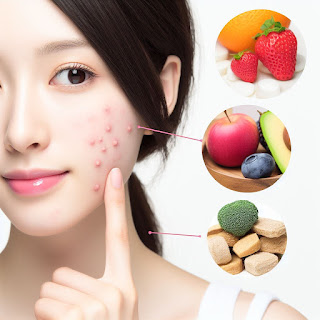Nutritional tips for acne-free skin
 |
| A woman having acne-free skin with nutritional tips |
Skincare is an essential aspect of our daily routine that helps us maintain healthy and glowing skin. It is a multi-billion dollar industry that offers a wide range of products and services to cater to the diverse needs of consumers. In this article, we will explore the key factors that impact skincare, including nutritional tips for acne-free skin. We will also discuss the tradeoffs involved in balancing different factors and explore the challenges associated with different approaches. Finally, we will highlight the importance of considering the impact on when making decisions about skincare.
Factors that Impact Skincare
Skincare is a complex process that involves several factors, including genetics, lifestyle, diet, and environmental factors. Genetics plays a significant role in determining the type of skin we have, such as oily, dry, or combination skin. Lifestyle factors such as smoking, alcohol consumption, and lack of sleep can also impact our skin's health. A healthy diet rich in vitamins and minerals can help improve skin health and prevent skin problems such as acne, wrinkles, and fine lines. Environmental factors such as pollution, UV radiation, and harsh weather conditions can also damage our skin and cause premature aging.
Nutritional Tips for Acne-Free Skin
Acne is a common skin problem that can be caused by several factors such as genetics, stress, and hormonal imbalances. A healthy diet can help prevent and reduce acne. Here are some nutritional tips for acne-free skin:
1. Eat a Balanced Diet: A balanced diet rich in fresh fruits and vegetables, whole grains, lean protein, and healthy fats can help improve skin health and prevent acne. Foods rich in antioxidants such as berries, nuts, and leafy greens can help protect the skin from damage caused by free radicals.
2. Avoid Processed Foods: Processed foods such as chips, cookies, and sugary drinks can cause inflammation and increase the risk of acne. It is best to avoid these foods and opt for whole foods instead.
3. Stay Hydrated: Drinking plenty of water can help flush out toxins from the body and keep the skin hydrated. Dehydration can cause dryness and make the skin more prone to acne.
4. Limit Dairy Intake: Dairy products such as milk, cheese, and yogurt can trigger acne in some people. It is best to limit dairy intake and opt for plant-based alternatives such as almond milk or soy milk.
Balancing Different Factors
Balancing different factors is crucial to achieving healthy and glowing skin. For example, using too many skincare products can damage the skin's natural barrier and cause irritation and inflammation. On the other hand, using too few products can lead to dryness and premature aging. Therefore, it is essential to strike a balance between using the right products in the right amounts and following a healthy lifestyle and diet.
Challenges Associated with Different Approaches
Different approaches to skincare can pose several challenges. For example, natural remedies may not work for everyone and may take longer to show results than conventional treatments. Similarly, conventional treatments such as chemical peels and laser therapy can be expensive and may cause side effects such as redness, swelling, and scarring. Therefore, it is essential to choose an approach that suits your skin type and condition and consult a dermatologist if necessary.
Considering the Impact on When Making Decisions about Skincare
When making decisions about skincare, it is essential to consider the impact on the environment and society. For example, choosing products that are cruelty-free, vegan, and eco-friendly can help reduce the carbon footprint and promote sustainability. Similarly, supporting local and small businesses can help boost the economy and create jobs.
In conclusion, skincare is a complex process that involves several factors, including genetics, lifestyle, diet, and environmental factors. A healthy diet can help prevent and reduce acne. Balancing different factors and choosing the right approach can help achieve healthy and glowing skin. Finally, considering the impact on when making decisions about skincare can help promote sustainability and social responsibility..





